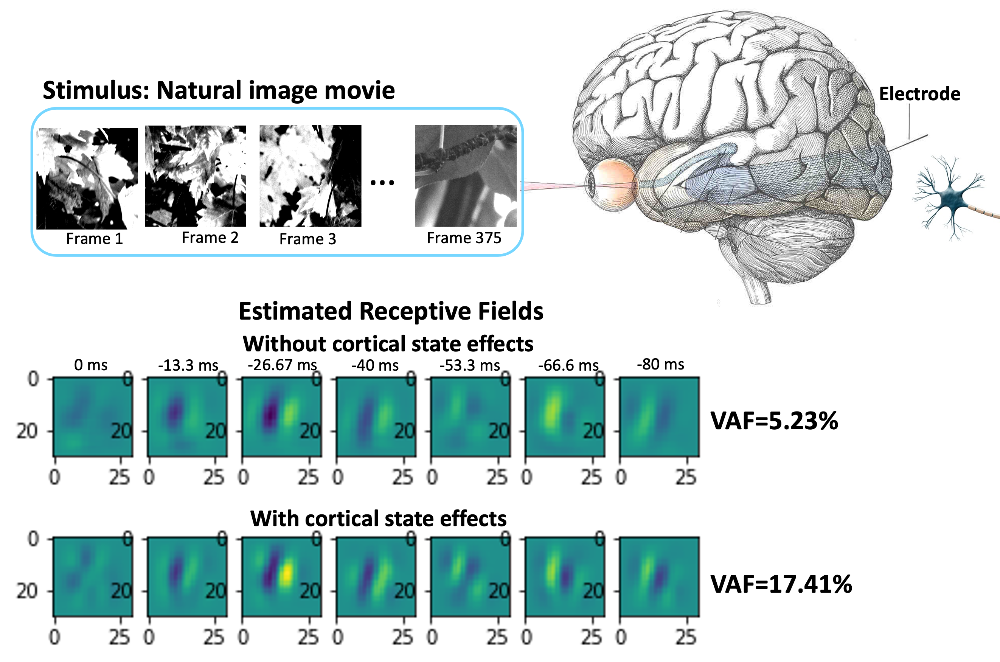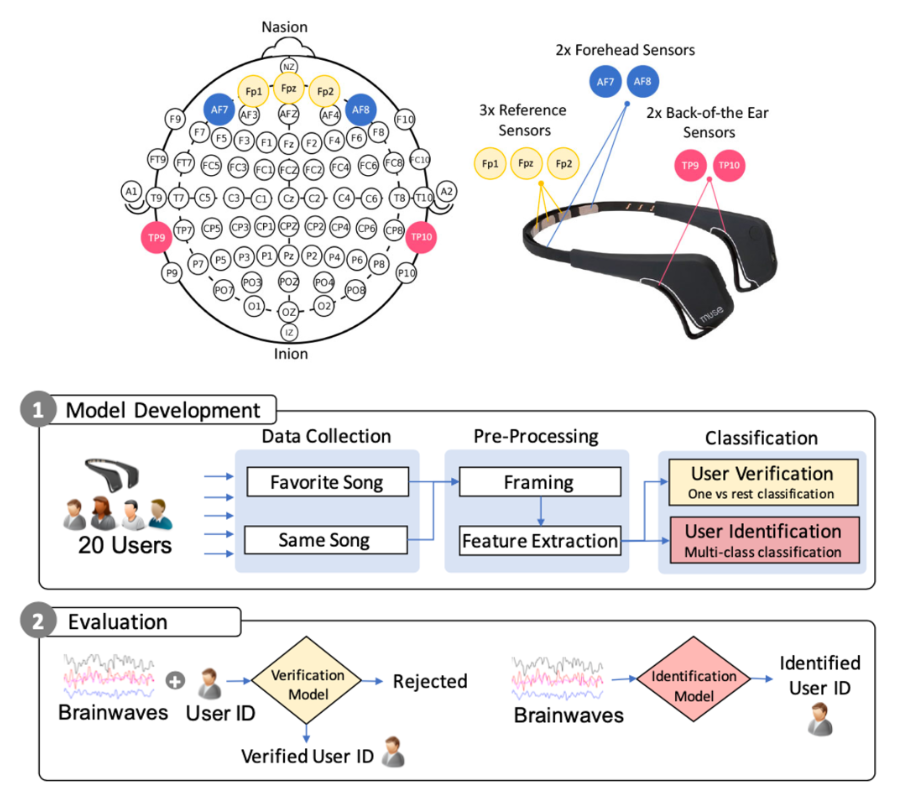Cortical state effects on responses of primary visual cortex neurons: A machine learning approach
PhD Thesis | McGill University, Canada
 In the field of visual neuroscience, computational models of a visual cortex neuron are useful for understanding its functional role within the mammalian brain. A successful model will be able to accurately predict a neuron's responses to any visual image. Understanding the activity of a single visual cortex neuron is especially challenging for model development because brain responses vary for repeated presentations of the same stimulus as a result of "brain-state" fluctuations (e.g., sleep, arousal, attention) that can affect large populations of neurons.
In the field of visual neuroscience, computational models of a visual cortex neuron are useful for understanding its functional role within the mammalian brain. A successful model will be able to accurately predict a neuron's responses to any visual image. Understanding the activity of a single visual cortex neuron is especially challenging for model development because brain responses vary for repeated presentations of the same stimulus as a result of "brain-state" fluctuations (e.g., sleep, arousal, attention) that can affect large populations of neurons.
Thus, the goal of my work is to develop novel computational models for single neurons that considers both brain-state and visual input, and alternative possible interactions between them, that can be used to evaluate neuronal responses in the visual cortex. The resulting models are expected to outperform existing models in terms of predictive accuracy, computational optimization and give new insights into the effects of brain-state fluctuations on visual perception. Ultimately, my work will provide a better understanding of the basic visual system that will contribute to developing treatment strategies for visual impairments caused by visual cortex pathology.
MusicID: A Brainwave-Based User Authentication System for Internet of Things
Internship project | Data61-CSIRO, Australia
 MusicID is an authentication solution for smart devices that uses music-induced brainwave patterns as a behavioral biometric modality. This work experimentally analyse data collected from real users whilst they are listening to two forms of music: 1) a popular English song and 2) individual's favorite song and shows that an accuracy over 98% for user identification and an accuracy over 97% for user verification can be achieved by using data collected from a 4-electrode commodity brainwave headset. Further MusicID shows that a single electrode is able to provide an accuracy of approximately 85% and the use of two electrodes provides an accuracy of approximately 95%. As already shown by commodity brain-sensing headsets for meditation applications, including dry electroencephalogram electrodes in smart headsets are feasible and MusicID has the potential of providing an entry point and continuous authentication framework for upcoming surge of smart devices mainly driven by augmented reality (AR)/virtual reality (VR) applications.
MusicID is an authentication solution for smart devices that uses music-induced brainwave patterns as a behavioral biometric modality. This work experimentally analyse data collected from real users whilst they are listening to two forms of music: 1) a popular English song and 2) individual's favorite song and shows that an accuracy over 98% for user identification and an accuracy over 97% for user verification can be achieved by using data collected from a 4-electrode commodity brainwave headset. Further MusicID shows that a single electrode is able to provide an accuracy of approximately 85% and the use of two electrodes provides an accuracy of approximately 95%. As already shown by commodity brain-sensing headsets for meditation applications, including dry electroencephalogram electrodes in smart headsets are feasible and MusicID has the potential of providing an entry point and continuous authentication framework for upcoming surge of smart devices mainly driven by augmented reality (AR)/virtual reality (VR) applications.
Removing subject dependencies on Non-Invasive Blood Glucose Measurement using Hybrid Techniques
Final year project | University of Moratuwa, Sri Lanka
 Diabetes mellitus is a major health problem which requires regular glucose monitoring and invasive blood glucose measuring systems with acceptable accuracies are currently used for these measurements. Several non-invasive
blood glucose measurement techniques are reported in research literature, but most of them are not commercially available due to low accuracy or dependency on individual physiological parameters. This work presents a hybrid technique to measure blood glucose levels non-invasively using a combination of multi-wavelength near infrared (NIR) spectroscopy and bio-impedance spectroscopy. Physiological parameters of individuals and other environmental factors that affect non-invasive glucose measurements have been identified and compensated to make the device work on any person without the requirement of complicated further calibrations. The measured parameters, along with the glucose levels of human subjects obtained from a commercial blood glucose meter is used to train a machine learning model (Random Forest regression algorithm). The trained system (with a training set of 315 data samples and a a test set of 80 data samples) predicted the blood glucose levels non-invasively with an accuracy of 90.7%.
Diabetes mellitus is a major health problem which requires regular glucose monitoring and invasive blood glucose measuring systems with acceptable accuracies are currently used for these measurements. Several non-invasive
blood glucose measurement techniques are reported in research literature, but most of them are not commercially available due to low accuracy or dependency on individual physiological parameters. This work presents a hybrid technique to measure blood glucose levels non-invasively using a combination of multi-wavelength near infrared (NIR) spectroscopy and bio-impedance spectroscopy. Physiological parameters of individuals and other environmental factors that affect non-invasive glucose measurements have been identified and compensated to make the device work on any person without the requirement of complicated further calibrations. The measured parameters, along with the glucose levels of human subjects obtained from a commercial blood glucose meter is used to train a machine learning model (Random Forest regression algorithm). The trained system (with a training set of 315 data samples and a a test set of 80 data samples) predicted the blood glucose levels non-invasively with an accuracy of 90.7%.
Other Projects
1. A Model-to-Brain mapping: Modelling ventral visual stream with AlexNet
Summer project | Neromatch Academy
2. WIMU based performance and injury analysis system for Sri Lankan Cricket team
Research | Center for Biomedical Innovation
3. Shimmer IMU based gait analysis system
Research | Center for Biomedical Innovation
4. A server monitoring/alarming system using Nagios
Implementation | Axiata Digital Labs & CAT telecom-Thailand
5. VeinViewer: An Affordable Vein Imaging Device
Research | University of Moratuwa
 In the field of visual neuroscience, computational models of a visual cortex neuron are useful for understanding its functional role within the mammalian brain. A successful model will be able to accurately predict a neuron's responses to any visual image. Understanding the activity of a single visual cortex neuron is especially challenging for model development because brain responses vary for repeated presentations of the same stimulus as a result of "brain-state" fluctuations (e.g., sleep, arousal, attention) that can affect large populations of neurons.
In the field of visual neuroscience, computational models of a visual cortex neuron are useful for understanding its functional role within the mammalian brain. A successful model will be able to accurately predict a neuron's responses to any visual image. Understanding the activity of a single visual cortex neuron is especially challenging for model development because brain responses vary for repeated presentations of the same stimulus as a result of "brain-state" fluctuations (e.g., sleep, arousal, attention) that can affect large populations of neurons.  MusicID is an authentication solution for smart devices that uses music-induced brainwave patterns as a behavioral biometric modality. This work experimentally analyse data collected from real users whilst they are listening to two forms of music: 1) a popular English song and 2) individual's favorite song and shows that an accuracy over 98% for user identification and an accuracy over 97% for user verification can be achieved by using data collected from a 4-electrode commodity brainwave headset. Further MusicID shows that a single electrode is able to provide an accuracy of approximately 85% and the use of two electrodes provides an accuracy of approximately 95%. As already shown by commodity brain-sensing headsets for meditation applications, including dry electroencephalogram electrodes in smart headsets are feasible and MusicID has the potential of providing an entry point and continuous authentication framework for upcoming surge of smart devices mainly driven by augmented reality (AR)/virtual reality (VR) applications.
MusicID is an authentication solution for smart devices that uses music-induced brainwave patterns as a behavioral biometric modality. This work experimentally analyse data collected from real users whilst they are listening to two forms of music: 1) a popular English song and 2) individual's favorite song and shows that an accuracy over 98% for user identification and an accuracy over 97% for user verification can be achieved by using data collected from a 4-electrode commodity brainwave headset. Further MusicID shows that a single electrode is able to provide an accuracy of approximately 85% and the use of two electrodes provides an accuracy of approximately 95%. As already shown by commodity brain-sensing headsets for meditation applications, including dry electroencephalogram electrodes in smart headsets are feasible and MusicID has the potential of providing an entry point and continuous authentication framework for upcoming surge of smart devices mainly driven by augmented reality (AR)/virtual reality (VR) applications.
 Diabetes mellitus is a major health problem which requires regular glucose monitoring and invasive blood glucose measuring systems with acceptable accuracies are currently used for these measurements. Several non-invasive
blood glucose measurement techniques are reported in research literature, but most of them are not commercially available due to low accuracy or dependency on individual physiological parameters. This work presents a hybrid technique to measure blood glucose levels non-invasively using a combination of multi-wavelength near infrared (NIR) spectroscopy and bio-impedance spectroscopy. Physiological parameters of individuals and other environmental factors that affect non-invasive glucose measurements have been identified and compensated to make the device work on any person without the requirement of complicated further calibrations. The measured parameters, along with the glucose levels of human subjects obtained from a commercial blood glucose meter is used to train a machine learning model (Random Forest regression algorithm). The trained system (with a training set of 315 data samples and a a test set of 80 data samples) predicted the blood glucose levels non-invasively with an accuracy of 90.7%.
Diabetes mellitus is a major health problem which requires regular glucose monitoring and invasive blood glucose measuring systems with acceptable accuracies are currently used for these measurements. Several non-invasive
blood glucose measurement techniques are reported in research literature, but most of them are not commercially available due to low accuracy or dependency on individual physiological parameters. This work presents a hybrid technique to measure blood glucose levels non-invasively using a combination of multi-wavelength near infrared (NIR) spectroscopy and bio-impedance spectroscopy. Physiological parameters of individuals and other environmental factors that affect non-invasive glucose measurements have been identified and compensated to make the device work on any person without the requirement of complicated further calibrations. The measured parameters, along with the glucose levels of human subjects obtained from a commercial blood glucose meter is used to train a machine learning model (Random Forest regression algorithm). The trained system (with a training set of 315 data samples and a a test set of 80 data samples) predicted the blood glucose levels non-invasively with an accuracy of 90.7%.